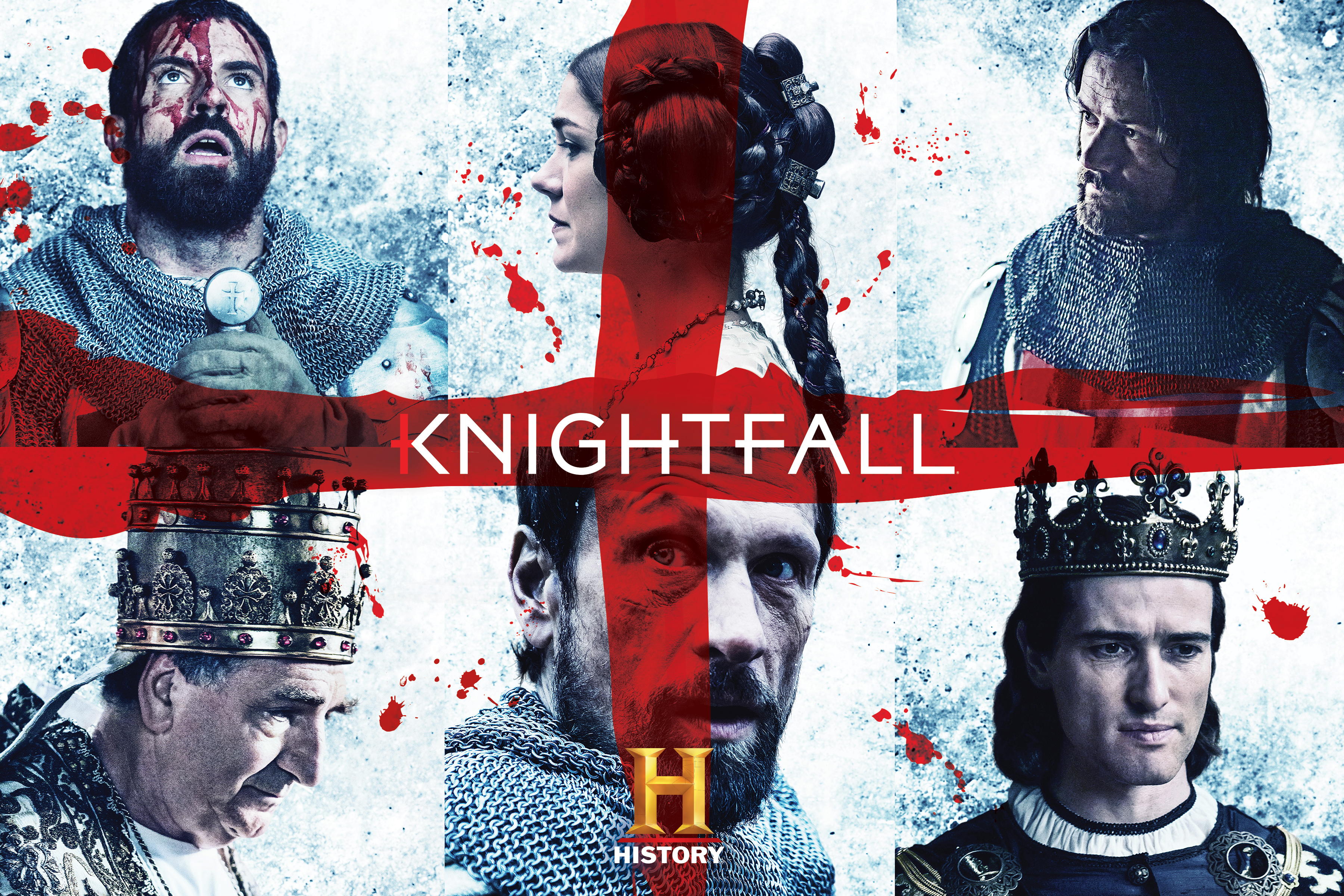Knightfall is coming to the HISTORY channel on 17 July, and we couldn’t be more excited. The popular show, which features a determined bunch of Knights Templar during the Crusades, has kept American viewers on the edge of their seats. Now, the series will finally be broadcast here in Britain. We spoke to three of the lead actors – Tom Cullen (who plays youthful protagonist Landry), Pádraic Delaney (Gawain, a fighting Templar) and Simon Merrells (Tancrede, whose fierce commitment to the Knights gets him into trouble) – to get their takes on Crusader history.
Can you tell us a bit about each of the characters you play?
Simon: I’m Tancrede, one of the Templar knights in the story, a loyal and fierce Templar who shows another side to his character as the series goes on. It’s set just after we lose the Holy Land. We’re this powerful military force stuck in Paris, but without a purpose.
Pádraic: I play Gawain. He’s also one of the 3 main knights and he’s probably one of the moodier, grumpier knights. But for good cause, because you see in episode 1 he sustains this injury which cripples him and means he can no longer be a warrior. That’s really devastating for him. Especially because he’s referred to as one of the best swordsmen in the temple. Not only does his wound fester over time, but his psychological wound festers as well.
Tom: Landry is a very brash, headstrong knight who is very conflicted. He’s having an internal and existential crisis about his relationship with God. He is thrust into the leadership of the Templars, and he is given the chance of redemption and the chance to heal his relationship with God. His arc through the first season is trying to come to terms with that.
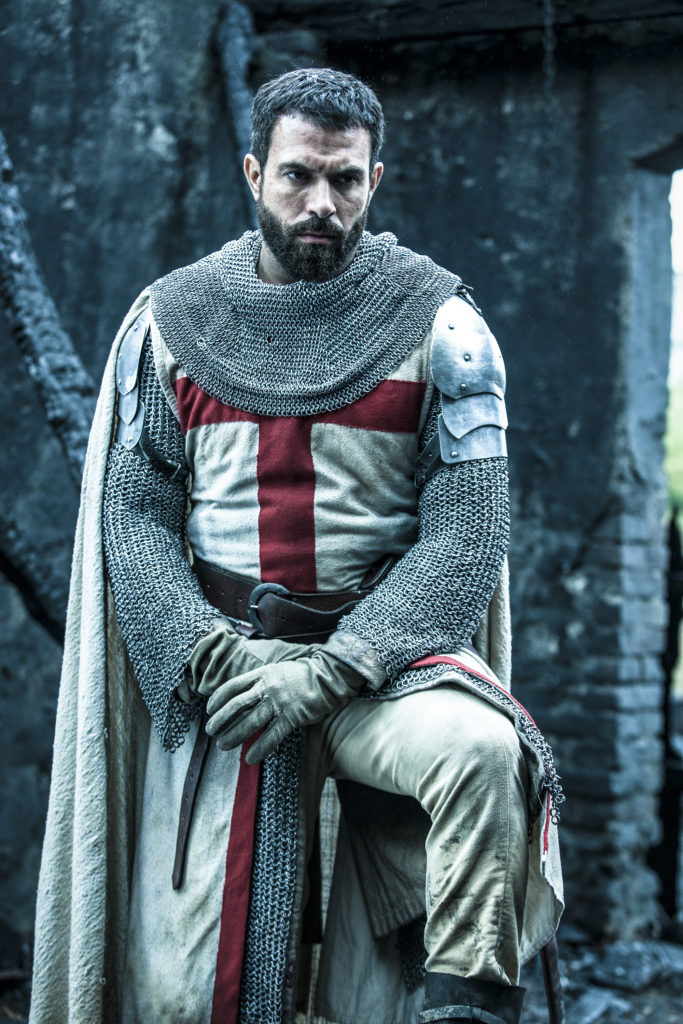
Tom Cullen as Landry
Why do you think he was having problems in his relationship with God?
Tom: He feels that God deserted him. When the show starts he’s a very confident and maverick knight. He believes God is on his side. But in the first ten minutes of the pilot episode, everything he thought he knew gets turned on its head. He feels God abandons him, and he loses the Holy Land. He loses the Holy Grail. He loses a sense of himself and who he is, but he starts to discover his humanity. He falls in love with a woman, even though he’s supposed to be celibate. He starts to question everything.
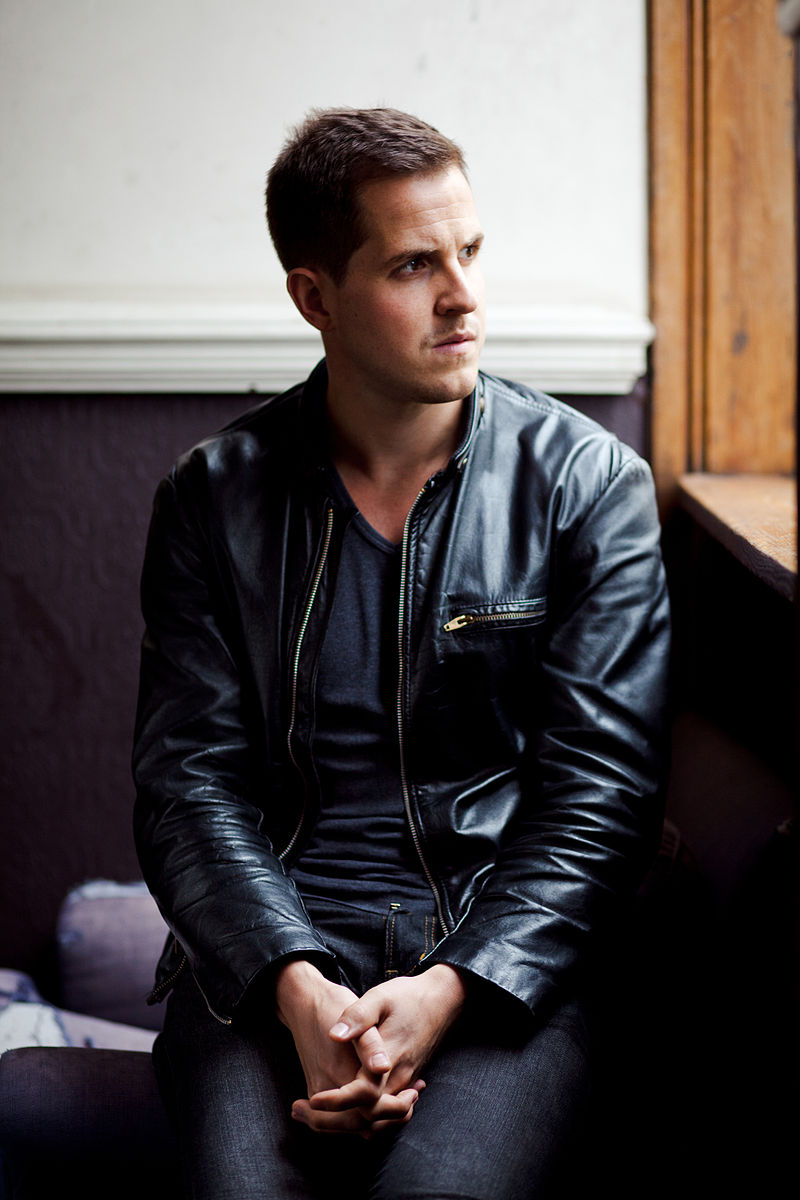
Historian Dan Jones acted as a consultant for the show
Dan Jones was a historical consultant – did you get to meet him?
Simon: He’s a great guy and we’re really blessed that we had him on the set, he’s like our oracle. We still maintain a great friendship with him. He goes against the grain of your stereotypical, fusty old historian. He’s pretty young, dynamic, has sleeve tattoos. His way of describing the Templars was very contemporary and fresh, it was great to have that on set and to have those little anecdotes and stories and insights. It was great to have him there.
What did you learn from him?
Simon: He’s written an extraordinary book, but we’d also talk to him about the Templars and the Templar Rules. It’s so detailed. It’s this big book of rules – including monastic and military ones. By all accounts, they lived by this code – which is mind-blowing, really. Dan would talk about the Templars through different eras, different battles, different timings in history, and the waxing and waning of their fortunes. He told us about the power they wielded – spiritual and military – and the glamour that they had. It was very exciting to step into that and to characterise these men.
Pádraic: Dan was also helpful – I remember asking what else was going on in the world at that time, aside from the Templars, and he’s so good at giving you little titbits of information. This is the same period of time when Longshanks was having trouble with his Scottish subjects, particularly a guy called William Wallace. Dante was writing the Divine Comedy. Just to give you the context of what’s going on in the world, as if you were to pick up a newspaper back then, you might be reading about that stuff. It might not necessarily help you with your character directly, but it fleshes out the world a bit more. It’s a more immersive experience, and it feeds into your performance.
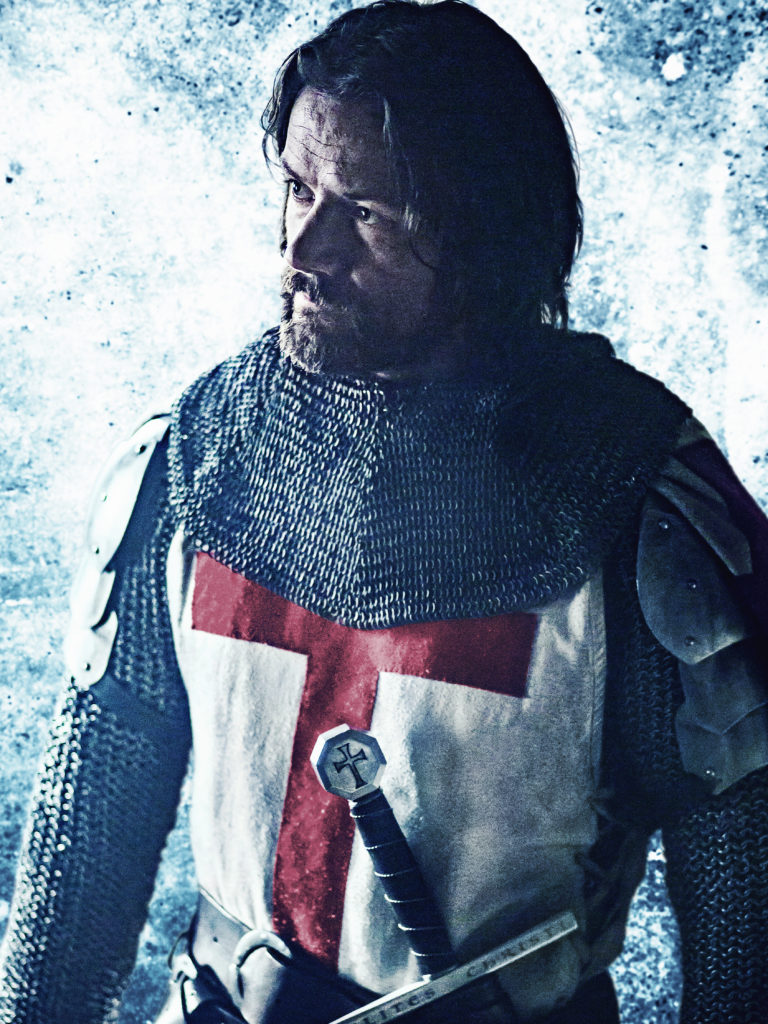 Pádraic Delaney as Gawain
Pádraic Delaney as Gawain
How else did you prepare for your respective roles?
Pádraic: There’s a number of books that are out there, and the HISTORY channel has loads of docudramas and stuff that you can dip into. Rather than learn all the dates and facts off by heart, we’d dip into it and we’d see each other on set and share titbits of information. Like, “Hey, I read this last night, isn’t it insane” and “The Templars did this” and it was that ongoing information sharing which informed everything we did.
Tom: The anecdotes always stand out for me. You can read a dry list of events and descriptions, but when you have contemporary anecdotes, they really stand out.
Are there any particular anecdotes that stood out?
Simon: I remember one in particular. The siege [of Ascalon] had gone on for a long time, and they’d been trying to make a breach in this castle that held out. There was a crack that appeared, from months of siege and attack and working at this wall. [The Templars] charged in ahead of the army, and they were all killed. None of them left the field, even when there was an exit. They could have left, but they didn’t because they stood around the banner. If the banner is still held aloft, then in the Templar rule, no Templar may retreat. They were viciously criticised for that afterwards, even though they’d all been killed and opened the wall. It kind of gives you an insight into their philosophy and to their commitment.
Also, other stories like when they were ruling the holy land, there was a famous Islamic poet [Usama ibn Munqidh] who was kind of an ambassador, because they [Crusaders and Muslims] weren’t always at war. This guy absolutely hated crusaders, with very good reason. But he writes very approvingly and with respect about the Templars. He writes “when I went into the Temple, the Temple master gave a strict order that their religious icons, the cross, was to be taken down and cleared so that I could pray to the East”. It’s extraordinary when you think about it, and it’s those things that stand out. It feeds your character, you’re playing a different set of men from the average crusader.
Pádraic: We’re actually driving through Strand at the moment and Temple station is just to our left. Of course it’s named after Temple Church, which is just a few hundred yards from where we are. The legacy of the Templars still exists to this day – it’s just struck me as we’re in the car.
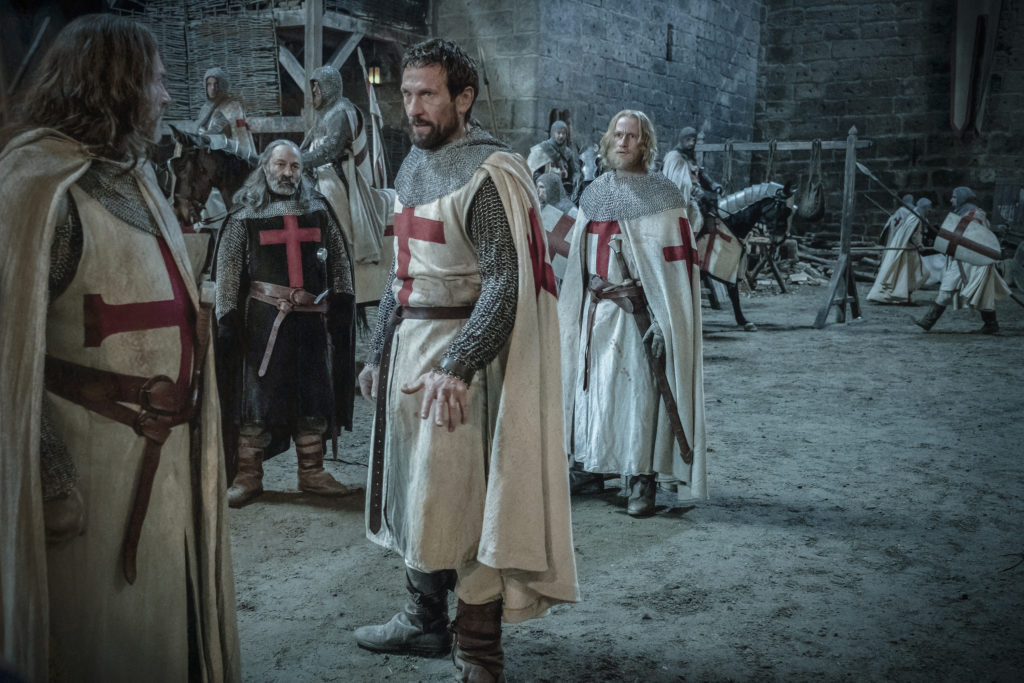
Simon Merrells plays Tancrede
What were the personal motivations for your characters to join the crusades?
Tom: My character Landry joined the Templars when he was 11, which was very rare. The Templars didn’t like taking on young men and children, because it was such a monastic lifestyle, that it had to be a very conscious, adult choice to join the Templars. I think part of his struggle is that he’s been in the Templars all his life, and has been indoctrinated. He’s trying to find himself with inside the construct of the Templars. His reason for going to the Holy Land was purely that everyone else was, and that’s what he felt he was supposed to do.
Pádraic: The characters have all made commitments, sacrifices. Gawain had previously been a lord – he had lands, titles and all of that – before he gave everything up and joined the Templars. To do that, you’ve got to really believe 100% in what you’re about to join. Their relationship with God must have been quite personal. To give all your identity up for another identity is a very personal thing to do.
Simon: These men were seen to be always in civilian life, in private, to be men of really good humour. Always choosing to find lightness and humour in their interactions with people. Very charitable, which was part of their religious ethos. But in battle, utterly ferocious and ruthless. You have the two sides of these extraordinary characters. All the characters are different, there’s often jokes and laughter, but when it comes to the battle they’re utterly devastating. It was considered righteous violence. They had a code, they weren’t like all of the crusaders, especially the Early crusaders.
Pádraic: They believed they were doing everything in the name of God, that they had God on their side. That might be a difficult concept for us, but for them, they were invincible.
Knightfall premieres in the UK on the HISTORY Channel (Sky 130 / Virgin 270 / BT 327 / TalkTalk 327) at 9pm on 17th July.
